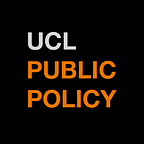Beyond the lecture theatre: why public policy needs social scientists
By Nifemi Alonge, UCL Social Research Institute, UCL Institute of Education
How does an understanding of inequality help shape the UK’s COVID response? Do big cultural shifts like those that happened under lockdown have lasting policy implications? How can behavioural economics improve public health? These are some of the big picture questions that Social Sciences students in UCL’s Social Research Institute (SRI) are taught to contemplate.
The Social Sciences Society is a departmental society for the SRI within the UCL Institute of Education. We are interested in areas such as healthcare, economic management and, more generally, how the process of policy creation can impact the world around us. As a student society, we are constantly grappling with the question how can we use our skills to address society’s most pressing challenges?
To answer this, we knew that we had to get beyond the ‘classroom’ — but how?
Our response was simple; we put on our first ever policy careers event. We used our professional networks and alumni contacts to get three amazing panellists: Social Sciences alumni Ashly Fuller, who is currently pursuing a PhD on the use of AI in the allocation of welfare benefits; Nikita Glass, another alumni currently working at the Home Office; and Saeed Kidwai, an economic advisor at the Cabinet Office.
We chose these speakers to showcase the wide range of policy roles available; Ashly was able to tell us about policy research and how this affects decision makers, while Nikita, from her work in the Homes Office directorates, gave us a sense of the work needed to support policy creation. As an economist undertaking analytical work to support policy makers, Saeed was able to illustrate some of the more technical roles available. As co-Treasurer of the Social Sciences Society, I chaired the event, along with UCL Public Policy’s Reuben Williamson.
The speakers began by talking us through their educational and professional journeys, before discussing the day to day of working in public policy. Saeed made it clear that no two days are the same: his work ranges from economic modelling and literature reviews to attending meetings, presenting and working with ministers. Ashly and Nikita discussed how social science skills are vital for policy work and research. Nikita shared how important teamwork and collaboration are in her role, both across different departments and with people from different backgrounds. She noted that in order to come to the best decisions, it is vital to be open to having conversations across divides and listening to differing opinions. This reminded me of my time engaging in discussions with my peers throughout my degree. The social science courses are incredibly diverse, and discussions were always interesting opportunities to hear really varied opinions and challenge one another’s world views.
Reuben asked what the pandemic’s legacy would be to public policy. Both Saeed and Nikita said that it was too early to say given all the current uncertainty. But in amongst that, existing government priorities are still being carried out to ensure manifesto commitments are met. Nikita brought up policy changes influenced from outside politics — the push for greater free school meals by campaigners like Marcus Rashford, for example. She suggested that the policy priorities pushed by these campaigns are likely to have a lasting effect way beyond the initial fallout from the pandemic.
In the academic field, Ashly highlighted how those within social policy are optimistic for the future. She talked us through how major events, like the pandemic, can create ‘earthquakes’ that lead to sudden changes in policy direction and shifts in political priorities. One recent example of this is the walking and cycling revolution in the UK. Spurred on by pandemic travel restrictions, the government has earmarked £2bn to boost ‘active travel’.
The event stimulated a lot of thoughtful discussion around careers. Audience members were very interested in how a social science degree had prepared them for the civil service, the merits of pursuing further study and how to upskill to stand out in job applications. And we ended by asking the panellists their top careers advice: “be relentless and do your research!”.
Organising digital events: challenges and tips
It has been incredibly tough to organise engaging events during these virtual times. The challenges are multiple and range from when to schedule the event and platform accessibility to how to structure it. Due to the pandemic, many students did not return to London last autumn, with members currently residing in China, Singapore, India and further afield. Trying to find a time that would work for multiple time zones and for members who may have caring responsibilities — as well as for the panellists who have full time day jobs — was a challenge. Whilst we could only cater to those on GMT and nearby time zones, we were able to record the event, meaning those who missed the live session could watch it at a later stage.
Structuring an online event that would engage our members and be interactive was also a key consideration. Sitting in a room with the panellists and attendees lends itself to an automatic engagement — as you are physically present. But when there are so many online talks available, we had to consider how to attract our audience and keep them interested. The choice of questions was key here. We chose questions that we genuinely thought were interesting to our members and that would be of use to their future careers. We also decided to have two chairs to make the event more dynamic.
________________________________________________________________
More about the Author
Nifemi Alonge is a third year UCL BSc Social Sciences and Quantitative Methods student. You can read her blog here or visit her profile on LinkedIn here.
